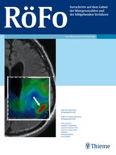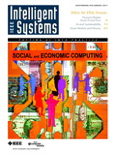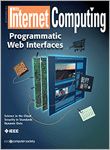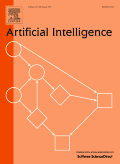
Kunstliche Intelligenz
metrics 2024
Transforming Knowledge in Artificial Intelligence
Introduction
Künstliche Intelligenz is a premier journal dedicated to the field of Artificial Intelligence, published by Springer Heidelberg in Switzerland. With an ISSN of 0933-1875 and an E-ISSN of 1610-1987, this journal serves as a vital platform for the dissemination of cutting-edge research and innovations in AI. Recognized within the Scopus ranking as #78 out of 350 in the category of Computer Science _ Artificial Intelligence, it holds a significant place within the academic community, reflecting a 77th percentile standing in its field. The journal operates in a traditional publishing model, offering a comprehensive scope that spans major advancements and theoretical explorations in AI from 2010 to 2024. As a Q3 journal within its category for 2023, Künstliche Intelligenz is poised to foster critical dialogue and collaboration among researchers, practitioners, and students, making it an essential resource for anyone looking to stay abreast of the transformative developments in artificial intelligence.
Metrics 2024
 0.65
0.65 2.80
2.80 2.60
2.60 30
30Metrics History
Rank 2024
Scopus
IF (Web Of Science)
JCI (Web Of Science)
Quartile History
Similar Journals

ROFO-FORTSCHRITTE AUF DEM GEBIET DER RONTGENSTRAHLEN UND DER BILDGEBENDEN VERFAHREN
Advancing the Frontiers of Radiological ScienceROFO-Fortschritte auf dem Gebiet der Röntgenstrahlen und der bildgebenden Verfahren, published by Georg Thieme Verlag KG, is a pivotal journal in the fields of radiology and nuclear medicine, offering invaluable insights for researchers, healthcare professionals, and students alike. With an ISSN of 1438-9029, this journal has been a stalwart of scientific communication since its inception in 1975, actively contributing to advancements in imaging techniques and radiation therapy. Although it operates under traditional access, the journal maintains a respectable standing, reflected by its Q3 ranking in Radiology, Nuclear Medicine and Imaging and Q4 in Medicine (miscellaneous), highlighting its significance in the scholarly community. Its coverage spans a wide array of topics pertinent to diagnostic imaging and therapy protocols, making it an essential resource for anyone seeking to understand the complexities of modern radiological practices. As the journal continues to evolve through 2024, it invites contributions that enrich the dialogue around technological innovations and clinical applications in the realm of imaging modalities.

AI & Society
Navigating the Ethical Landscape of Artificial IntelligenceAI & Society, published by Springer, is a premier journal that addresses the intricate relationship between artificial intelligence and societal values, offering critical insights into how technology shapes and is shaped by human interactions. With an impressive impact factor and consistently placed in the upper tiers of various categorical rankings, including Q2 rankings in both Artificial Intelligence and Human-Computer Interaction, as well as a Q1 ranking in Philosophy, this journal is essential for scholars looking to explore the ethical, philosophical, and practical dimensions of AI deployment in real-world contexts. Based in the United Kingdom, AI & Society spans from 1987 to 2024 and is widely recognized among researchers in the fields of philosophy, computer science, and social studies. Scholars can access a wealth of thought-provoking articles and reviews, contributing to the ongoing discourse on the implications of AI in contemporary society.

AI, published by MDPI, is a distinguished open access journal dedicated to advancing the field of artificial intelligence. Since its inception in 2020, the journal has swiftly established itself as a prominent platform for scholarly research, currently ranking in the Q2 category for 2023 within the artificial intelligence sector according to Scopus. With an impressive global reach from its base in Basel, Switzerland, the journal aims to foster innovation and collaboration among researchers, professionals, and students alike, providing a forum to share groundbreaking findings and applications in AI. The journal's commitment to accessibility ensures that research is available to a wide audience, enhancing knowledge dissemination and contributing significantly to the ongoing evolution of artificial intelligence technologies. To explore the latest in AI research, readers can access articles through their open access model, encouraging an inclusive academic environment.

IEEE INTELLIGENT SYSTEMS
Advancing Knowledge in Intelligent SystemsIEEE Intelligent Systems, published by the renowned IEEE Computer Society, stands at the forefront of research in the fields of Artificial Intelligence and Computer Networks and Communications. With an impressive Q1 ranking in both categories as of 2023 and Scopus rankings placing it in the top 5% of its field, this journal not only showcases cutting-edge scientific advancements but also serves as a vital resource for practitioners, academics, and students seeking to deepen their understanding and application of intelligent systems. The journal covers a broad range of topics including machine learning, data mining, and system architectures, reflecting its commitment to addressing contemporary challenges and innovations in technology. Although it does not offer open access, the journal's research contributions are invaluable, ensuring that its readership remains engaged with the latest findings and applications in a rapidly evolving field. For those interested in submitting high-quality research or staying updated on the latest developments, IEEE Intelligent Systems represents an essential hub of knowledge.

IEEE INTERNET COMPUTING
Pioneering Insights in Network CommunicationsIEEE Internet Computing is a prominent journal in the field of computer networks and communications, published by the esteemed IEEE Computer Society. With an impressive impact factor and ranking in the Q1 category for 2023, it stands out as a vital resource for researchers, professionals, and students alike, seeking to delve into the latest advancements and trends in internet computing. Since its inception in 1997, the journal has provided a platform for pioneering studies and insightful discussions that bridge theory and practice in the rapidly evolving digital landscape. The journal is indexed with an excellent Scopus rank of #77 out of 395, placing it in the 80th percentile of its category, which underlines its relevance and influence in the academic community. While it currently does not offer Open Access options, its rich archive of scholarly articles remains accessible to those affiliated with research institutions and libraries. Furthermore, the journal's comprehensive coverage continues through 2024, ensuring it remains at the forefront of the discipline.

IEEE Computational Intelligence Magazine
Innovating the Future of Artificial Intelligence ResearchIEEE Computational Intelligence Magazine, published by the esteemed IEEE-INST ELECTRICAL ELECTRONICS ENGINEERS INC, is an essential resource for researchers and professionals in the fields of Artificial Intelligence and Theoretical Computer Science. With a robust Q1 ranking in both categories for 2023, this magazine stands out as a leader in disseminating cutting-edge research and innovative applications within computational intelligence. As an invaluable conduit for knowledge, it covers a diverse range of topics, including but not limited to machine learning, neural networks, and data mining. The magazine is particularly recognized for its interdisciplinary approach, bridging gaps between theory and application while contributing to advancements in technology and society. Although it does not offer open access, the insights provided are critical for staying at the forefront of this rapidly evolving discipline. Join a community of like-minded scholars and practitioners by exploring the latest findings and trends published from 2006 to 2024, operating from its headquarters at 445 Hoes Lane, Piscataway, NJ, United States.

NEURAL COMPUTING & APPLICATIONS
Advancing the Frontiers of AI and Software EngineeringNEURAL COMPUTING & APPLICATIONS is a premier journal dedicated to the burgeoning fields of Artificial Intelligence and Software Engineering, published by Springer London Ltd. Established in 1993, the journal serves as a pivotal platform for disseminating cutting-edge research and innovative applications in neural computing, covering a broad range of topics from algorithm development to real-world applications. With its impressive categorization in the 2023 Journal Quartiles—ranging Q2 in Artificial Intelligence and Q1 in Software—it stands out in its discipline, ranking 42nd out of 407 in Computer Science Software and 50th out of 350 in Computer Science Artificial Intelligence, reflecting its significant impact in the academic community. Although not an open access journal, it provides vital access to significant findings and methodologies that drive advancements in technology. Researchers, professionals, and students looking to stay abreast of the most relevant and impactful developments in these fields will find NEURAL COMPUTING & APPLICATIONS an indispensable resource.

ARTIFICIAL INTELLIGENCE
Unraveling the Complexities of AI Through Linguistic InsightArtificial Intelligence, published by Elsevier, is a premier scholarly journal that has been at the forefront of research in the fields of Artificial Intelligence, Linguistics, and Language Studies since its inception in 1970. With a prestigious ranking in the Q1 quartile for both its primary categories, the journal is recognized for its significant contributions to the understanding and advancement of AI technologies and their applications in natural language processing. It is highly regarded in academic circles, reflected in its exceptional Scopus Rankings—placing it in the 99th percentile in both Arts and Humanities, and Social Sciences, as well as a respectable 85th percentile in Computer Science, specifically within Artificial Intelligence. Although Open Access options are not currently available, the journal provides a vital platform for researchers, professionals, and students to disseminate groundbreaking ideas, fostering innovation and collaboration in this rapidly evolving field. The journal's comprehensive scope aims to bridge theoretical advancements with practical applications, making it an invaluable resource for those seeking to explore the intersection of technology and linguistics.

JMIR Medical Informatics
Unlocking the Potential of Medical Data for Better OutcomesJMIR Medical Informatics is a leading open access journal dedicated to the field of medical informatics, published by JMIR Publications, Inc. since 2013 in Canada. With an impressive impact factor and a distinguished Q2 ranking in both Health Informatics and Health Information Management categories, this journal plays a pivotal role in disseminating cutting-edge research and innovative practices. Covering a wide scope that includes clinical informatics, health information systems, and data analytics, JMIR Medical Informatics provides valuable insights for researchers, practitioners, and policymakers alike. The journal is accessible to a global audience, ensuring that pioneering studies and methodologies reach those who can apply them to enhance health outcomes. With its commitment to advancing the body of knowledge in medical informatics, this journal stands as a vital resource for anyone involved in or studying the intersection of healthcare and technology.

Progress in Artificial Intelligence
Charting New Territories in AI ResearchProgress in Artificial Intelligence is a leading journal published by SpringerNature, dedicated to advancing knowledge and research in the field of artificial intelligence. With a strong emphasis on the latest developments from 2012 through 2024, this journal enjoys a prominent position, holding a Q2 ranking in the prestigious Artificial Intelligence category for 2023, as well as achieving an impressive ranking of 64 out of 350 in the Computer Science - Artificial Intelligence category on Scopus, placing it in the 81st percentile. Progress in Artificial Intelligence serves as an essential platform for researchers, professionals, and students seeking to share innovative algorithms, applications, and theoretical advancements. Although it operates under a subscription model, its commitment to disseminating high-quality research and fostering collaboration in the AI community significantly contributes to the ongoing evolution of this exciting discipline.